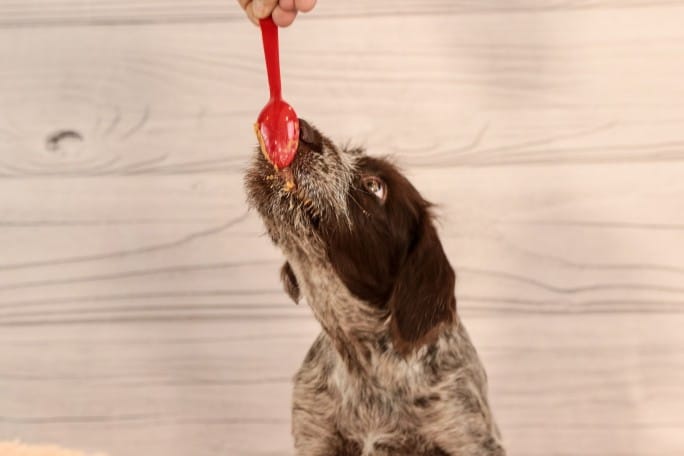Xyli-what? Pets and Dangers of Xylitol

You may (or may not) have heard of Xylitol, a sugar substitute commonly used in many foods. In fact, you may even enjoy sugar free gum, cereal, or peanut butter sweetened with the substance. But are you aware that Xylitol is toxic to dogs and cats?
We have many questions about human foods that are safe (or not) for our pets. Although Xylitol recently made the national news cycle as an ingredient in peanut butter, it’s being used in more foods than ever thanks to the low-carb diet craze.
It’s our job to raise awareness of potential threats to your pet, and we hope that giving you an idea of what Xylitol is and where it is used can help keep your furry friends safe!
What is Xylitol?
A chemical compound discovered in 1891, Xylitol is commonly used as a sugar substitute due to its sweet taste, sugar-like consistency, and low glycemic index. It has fewer calories than sugar, making it a popular choice among those looking to lose weight. It is also effective at preventing mouth bacteria from producing tooth-harming acids, and is being used more and more in oral health care products like toothpaste, mouthwash, and sugar-free gum.
Xylitol Toxicity
In dogs, cats, and certain other animals, Xylitol causes a massive insulin release from the pancreas and a resulting dramatic drop in blood sugar. This low blood sugar (hypoglycemia) is the basis for Xylitol toxicity, which can be deadly.
Vomiting is typically the first sign of Xylitol toxicity, and can appear anywhere from a few to 12 hours after ingestion. Dangerously low blood sugar levels can also result in weakness, trembling, seizures, and collapse. In large doses, Xylitol causes hepatic necrosis, a form of acute liver failure. This condition is a health crisis that can ultimately result in death if not treated aggressively.
Dogs are the usual victims of Xylitol toxicity due to their indiscriminate palates and tendency to “get into things” they should not. Cats are just as susceptible to the drop in blood sugar that causes toxicity, but they rarely eat enough of any Xylitol containing item to cause severe symptoms.
Foods That Contain Xylitol
The list of foods and other products containing Xylitol is growing all the time, so it’s always a good idea to read labels. Some common products include:
- Peanut butter
- Chewing gum
- Toothpaste
- Mouthwash
- Candy
- Breath mints
- Fruit drinks
- Energy drinks
- Jam and jelly
- Over the counter vitamins, especially children’s vitamins
- Baked goods
- Cereal
- Jello and puddings
- Cosmetics
- Personal care products
- Nasal sprays, sleep aids, and other over the counter medications
- Prescription medications, including many suspensions and syrups
It may be listed as an “inactive ingredient” under the main ingredient list. So if you encounter a product labeled “artificially sweetened” you may want to assume it contains Xylitol. Also keep in mind that technically, Xylitol is a “natural” sweetener. Best to look for specifics on food labels!
Treatment of Xylitol Toxicity
Ingestion of Xylitol is a veterinary medical emergency. Don’t hesitate; bring your dog to us immediately. If it’s after hours, go to the nearest emergency clinic. Make sure to bring along the label of the product consumed, to aid your veterinarian in deciding a course of treatment.
Treatment depends upon the amount of Xylitol eaten and how quickly the pet is presented to the veterinarian for treatment. If we can induce vomiting in the first 30 minutes after ingestion, we have a head start on the effects of Xylitol on the body. But if Xylitol has left the stomach and is affecting insulin release, aggressive and lengthy treatment is required for the best prognosis. This may include:
- Hospitalization, with 24 hour monitoring
- IV fluids
- Medications to protect the liver and IV glucose
- Blood tests to monitor the effects and treatment
- Blood transfusions
Now, we can assume you’re about to rush around your house looking at labels to see what contains Xylitol. We’d be interested to know what you find! If you decide to keep Xylitol labeled products in your home, make sure they are stored safely, and kept far away from your curious and crafty pets.
Give us a call if you have any questions, and as always, Bowman Veterinary Hospital is here to help.


